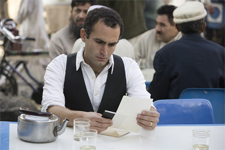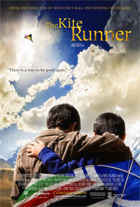The Kite Runner
|  Like many adaptations of beloved novels, there is something slightly stiff and a little too tasteful about Marc Forster's The Kite Runner. Spanning more than two decades of time and shifting from pre-Soviet-invasion Afghanistan, to southern California, and back to Afghanistan under the rule of the Taliban, it is impossible for the film not to push some cultural and political buttons, although such work is largely muted in favor of the film's dramatic arc, which follows a cowardly child's redemption as an adult when he is given the chance to do something that he failed to do 22 years earlier. Like many adaptations of beloved novels, there is something slightly stiff and a little too tasteful about Marc Forster's The Kite Runner. Spanning more than two decades of time and shifting from pre-Soviet-invasion Afghanistan, to southern California, and back to Afghanistan under the rule of the Taliban, it is impossible for the film not to push some cultural and political buttons, although such work is largely muted in favor of the film's dramatic arc, which follows a cowardly child's redemption as an adult when he is given the chance to do something that he failed to do 22 years earlier.The story opens in Afghanistan in 1978 and introduces us to Amir (Zekeria Ebrahimi), whose Baba (father) is a wealthy intellectual (Homayoun Ershadi) who is openly political in his derision of both communists and Islamic fundamentalists. Amir's best friend is Hassan (Ahmad Khan Mahmidzada), the son of his father's servant. Despite (or, really, because of) his lowly class status, Hassan is presented as a kind of saint figure, a kid of such bravery and loyalty that he would do anything for Amir. Amir recognizes this, but is too weak and cowardly to return the favor, most pointedly when Hassan is sexually assaulted by three older boys as a form of class-based vengeance, which turns out to be a pivotal moment in both of their lives. As Amir's father says about his son, “There's something missing in that boy,” one of many direct platitudes in the film that direct us toward its bigger themes. When the Soviets invade, Baba and Amir escape to the United States, and the story picks up 10 years later with Amir, now a young man with dreams of being a novelist, living with his ailing father in southern California. He meets and falls for Soraya (Atossa Leoni), the daughter of a former Afghan general (Abdul Qadir Farookh). While the first half of the film was somewhat leisurely in its pacing, giving a relatively rich portrait of life in Afghanistan before the Soviet invasion, this middle section is rushed. It feels more like a bridge than a real attempt to deal with the life of émigrés who have fled their war-torn homeland for a better life. In the film's final section, Amir is called back to Afghanistan to find the young son of Hassan, the childhood friend he betrayed and left. By now it is 2000 and the Soviets have been repelled, but the country has fallen into the hands of the exremist Taliban regime, who hang people in the streets, drive around the decaying cities with machine guns on “beard patrol,” and stone women for adultery in the middle of soccer stadiums. Having lived in the U.S. for some two decades, Amir's return to his former home is like stepping into a nightmarish parallel universe; everything good and sweet about his childhood has been destroyed or banned, even the flying of kites, which was his and Hassan's favorite activity. As the title suggests, kite flying becomes the film's overarching symbol, suggesting levels of freedom and childhood innocence that will be summarily cut down by the imposing forces of politics and religion. Director Marc Forster (Monster's Ball, Finding Neverland), who never met a symbol he didn't like, overplays this one significantly, giving us overcooked CGI-created kite's eye point-of-view shots that are ostensibly meant to bring us into the childhood excitement of the game, but instead feel like a lame and misplaced stab at action movie excitement. On a purely narrative level, The Kite Runner works well enough. In adapting Khaled Hosseini's 2003 novel, screenwriter David Benioff (25th Hour) finds ways to draw us directly into the story while presenting just enough background about Afghan culture to inform those not in the know. Granted, in a two-hour movie this essentially demands a rather shallow depiction of a foreign culture, but to do otherwise would have turned the film into a travelogue and brought the dramatic momentum to a grinding halt (see, for example, Gary Ross's well-intentioned but ultimately failed attempt to shoehorn Depression-era historical context into Seabiscuit). If the film never quite reaches the levels demanded by its profound subject matter, it is because Forster lays it on too thick, coating the hard edges of the story with a veneer of sentiment that works in the moment, but doesn't prove to be completely fulfilling. Copyright ©2007 James Kendrick Thoughts? E-mail James Kendrick All images copyright ©2007 Paramount Vantage |
Overall Rating: 

 (2.5)
(2.5)


